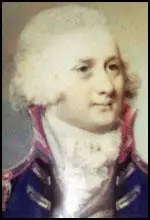John Clarkson

John Clarkson was was born in Wisbech on on 4th April 1764. His father, John Clarkson (1710–1766), was headmaster of Wisbech Grammar School. His brother, Thomas Clarkson, had been born 28th March 1760. After the death of his father, the family continued to live in the town.
In 1777, aged 13, he entered the Royal Navy as a "young gentleman" under the patronage of Captain Joshua Rowley and served primarily in the Caribbean. In 1783 he was promoted to the rank of lieutenant. His biographer, Hugh Brogan has pointed out: "A half-pay lieutenant with scant prospects of promotion in the peacetime navy, he was drawn inevitably into the great crusade. He acted as his brother's secretary and then as one of his agents."
In 1787 Thomas Clarkson and Granville Sharp formed the Society for the Abolition of the Slave Trade. Of the twelve members on the committee, nine were Quakers. Influential figures such as John Wesley and Josiah Wedgwood gave their support to the campaign. Later they persuaded William Wilberforce, the MP for Hull, to be their spokesman in the House of Commons.
In 1790 Thomas Clarkson recruited Alexander Falcolnbridge to go out to Sierra Leone on behalf of the Sierra Leone Company. The main objective of the company was to establish a colony of free black settlers. Falcolnbridge was appointed as a commercial agent with a £300 salary. Falcolnbridge became an alcoholic and Henry Thornton, the chairman of the renamed Sierra Leone Company, eventually replaced him as the company's commercial agent.
Thomas now sent his brother to Halifax, Nova Scotia, where there was a community of former American slaves who had fought for the British in the War of Independence, to recruit settlers for the abolitionist colony. With the support of Thomas Peters, the black loyalist leader, he led a fleet of fifteen vessels, carrying 1196 settlers, to Sierra Leone, which they reached on 6th March, 1792. Although sixty-five of the Nova Scotians died during the voyage, they continued to support Clarkson who they called "their Moses".
Slavery in the United States (£1.29)
John Clarkson became governor of the colony that was appropriately named as Freetown. However, as Hugh Brogan has argued: "It was the understanding between Clarkson and the Nova Scotians that got the colony through its very difficult first year. Clarkson's services were at first generally recognized. But great strains arose between him and the company directors, partly religious (he was not sympathetic to the insistent evangelicalism of Henry Thornton, the company chairman), partly because of the usual tension between head office and the man on the spot, and above all because Clarkson insisted on putting the views and interests of the Nova Scotians first, whereas the directors wanted the enterprise to show an early profit, so that they could compete successfully with the slave traders and bring to Africa Christianity."
Clarkson was dismissed as governor on 23rd April 1793. The following day he married Susan Lee (1769–1837), the daughter of a successful banker. The couple had ten children but six died in childhood. He became the manager of a chalk and lime quarry at Purfleet in Essex. Later he became a banker at Woodbridge, Suffolk. In 1816 he was one of the founders of the Society for the Promotion of Permanent and Universal Peace.
John Clarkson died of heart disease on 2nd April 1828 and was buried in the grounds of St Mary's Church in Woodbridge.

